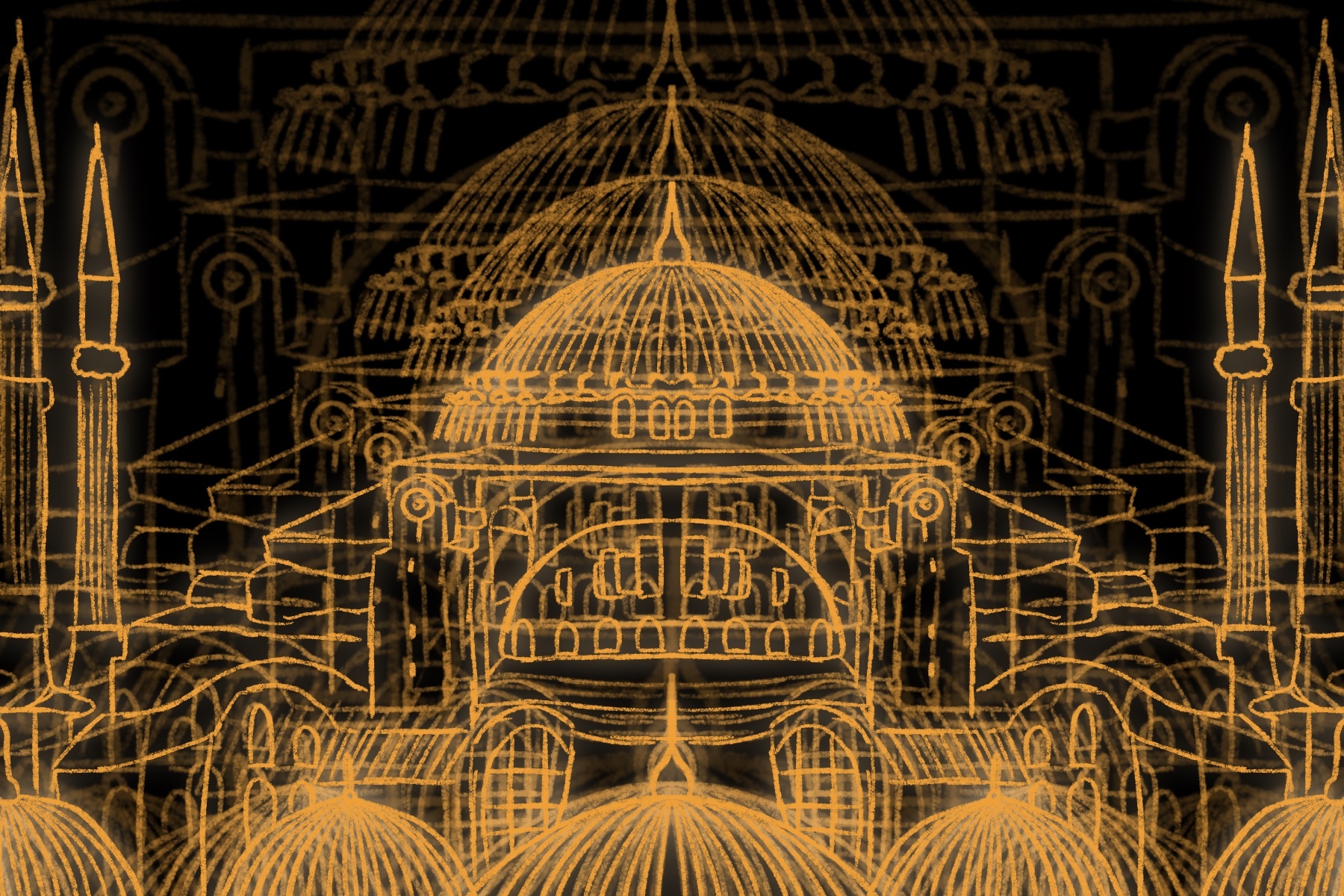The Hagia Sophia has been an important monument in present-day Istanbul ever since its construction under Justinian I, emperor of Constantinople. This building was a trailblazer for the Byzantine style of construction and was one of the first churches to employ a fully pendentive dome. While this may seem like an underwhelming accomplishment in comparison to the architectural feats of today, acknowledging the scale of the church at the time it was created is important. The monument has undergone numerous changes throughout its life.
It has faced countless interior redesigns due to a number of reasons. Changes in leadership led to new decisions on the proper way to worship: The conquest of Constantinople by the Turks led to structural changes that repurposed the building as an imperial mosque, appropriating the history of the monument to present Ottoman legitimacy.
Far more important than the history of physical changes in the Hagia Sophia is the history of its status. The Hagia Sophia existed as a church from its creation in the 6th century until it was converted into a mosque in the 15th century under Ottoman Sultan Mehmed II, shortly after Constantinople was conquered. Later, it was converted from a mosque into a museum in the early 20th century by Mustafa Kemal Ataturk, founder of the secular Republic of Turkey. This transition was important in that the Hagia Sophia no longer alienated visitors of any background, and marked the significant transition toward secularism in Turkey.
What’s New and Why Should You Care?
Recently, President Recep Tayyip Erdogan converted the Hagia Sophia back into a mosque, arguably rolling back Turkish secularism. Nationalism is arguably one of the greatest threats to humankind and Erdogan’s decision to revert the status of the Hagia Sophia can be interpreted as a step toward religious nationalism. Historically, for approximately a century, Turkish nationalism, while still problematic, has been somewhat secular. The former status of the Hagia Sophia as a museum reflected this religious secularism. Reverting the Hagia Sophia to a mosque poses a serious threat to secularism as Erdogan strives to make Istanbul more prominent in the Islamic world.
Religious nationalism is dangerous in that it challenges religious tolerance and threatens minority rights. In an increasingly diverse world, religious nationalism is divisive and detrimental to global secularism. Other countries have seen similar rises in nationalism, evinced by the election of Donald Trump or the UK’s decision to leave the European Union. These examples of nationalism threaten global unity and prioritize the separation of individual states, or religions, from the rest of the world.
Public and Professional Opinions
Georgetown’s Berkley Center provides a forum for editorial opinions on the new conversion of the Hagia Sophia, which allows us to examine the consequences of the monument’s status.
Heghnar Zeitlian Waternpaugh, an art historian, argues in her editorial response that the status change of the Hagia Sophia threatens cultural rights. When the Turks originally conquered Constantinople and converted the Hagia Sophia into a mosque, it was a statement of conquest. Waternpaugh argues that reverting the building back into a mosque in modern Istanbul makes the same statement of conquest, saying that “politicians invoked ‘the right of the sword’ to justify the building’s change of status, recalling Ottoman subjugation of Istanbul in the fifteenth century.” Waternpaugh further argues that the Turkish state has used cultural heritage as a political tool. Erdogan’s decision used the history of the Hagia Sophia to attack cultural secularism.
Yasir Yilmaz, in his post titled “Is the Conversion of Hagia Sophia Into a Mosque an Islamic Act?,” explains that many supporters of the decision to convert the Hagia Sophia back into a mosque cite the Islamic ruling that charitable trusts gain perpetual status, meaning that it was technically against the ruling to convert the monument into a museum.
He counters this by stating that many of these same supporters happen to ignore that the same charitable trust came with the confiscation of more than a thousand religious foundations. This means that a large number of buildings that now function as businesses or building complexes originally belonged to religious trusts, and their status is not being restored. In essence, Yilmaz argues that the decision to convert the Hagia Sophia back into a mosque does not stem from a longing to restore charitable trusts, but rather acts as a political decision.
Ramazan Kilinc goes as far as to argue that Hagia’s conversion into a mosque is bad for Muslims. He states that “figures such as Sayyid M. Syeed, president of the Islamic Society North America, found the move un-Islamic and counterproductive to Muslim interests globally.”
In his piece, he discusses the political implications of the conversion. Kilinc argues that the decision will fuel Islamophobia as political figures could use it in anti-Muslim discourse, which could threaten Muslim minorities in countries other than Turkey. Kilinic goes as far as to argue that the decision marks a decline in religion and a rise in religious nationalism, as “religious nationalism forms its identity against other religions or against secular nationalism.” The Hagia Sophia’s conversion threatens secularism and threatens other religions who wish to appreciate cultural unity at the Hagia Sophia.
Conclusion
Erdogan’s decision to convert the Hagia Sophia from a museum to a mosque was a political statement executed to further Istanbul’s political prominence within the Muslim world, as well as a statement of religious nationalism that poses a danger to secularism within Istanbul and worldwide. The original conversion from mosque to museum at the beginning of the 20th century was a proclamation of Turkish secularism that Erdogan effectively attacked in his decision. While it can be argued that Erdogan was within his rights to revert the monument back to a mosque due to its former status as a charitable trust, Erdogan has not evoked this same right in the many other charitable trusts that have evolved past their former statuses. The conversion of the Hagia Sophia poses a threat to secularism within Turkey, a potential threat to Muslims worldwide and is an attack on multiculturalism and global unity.












